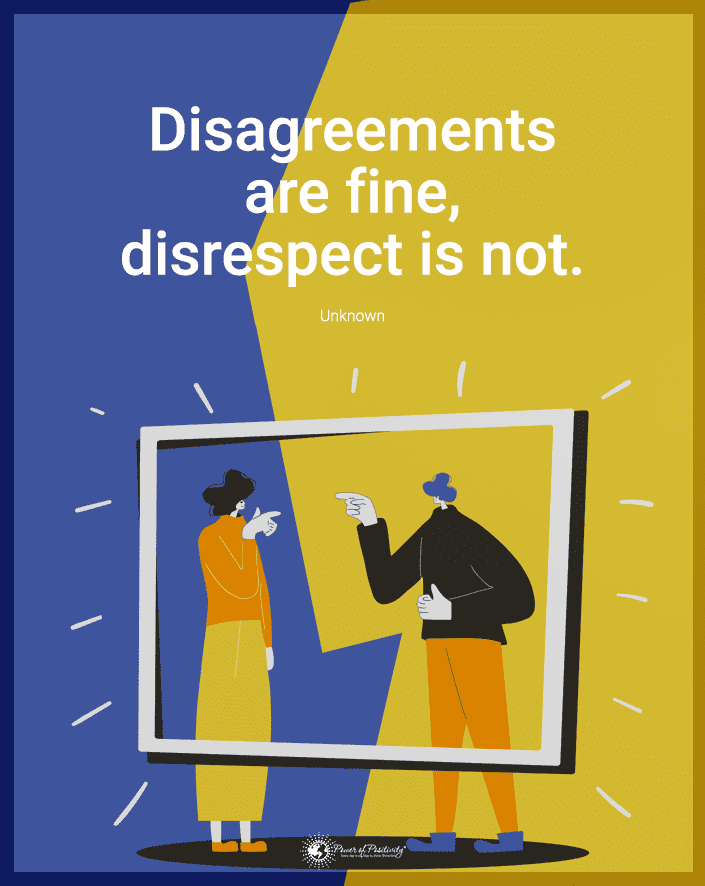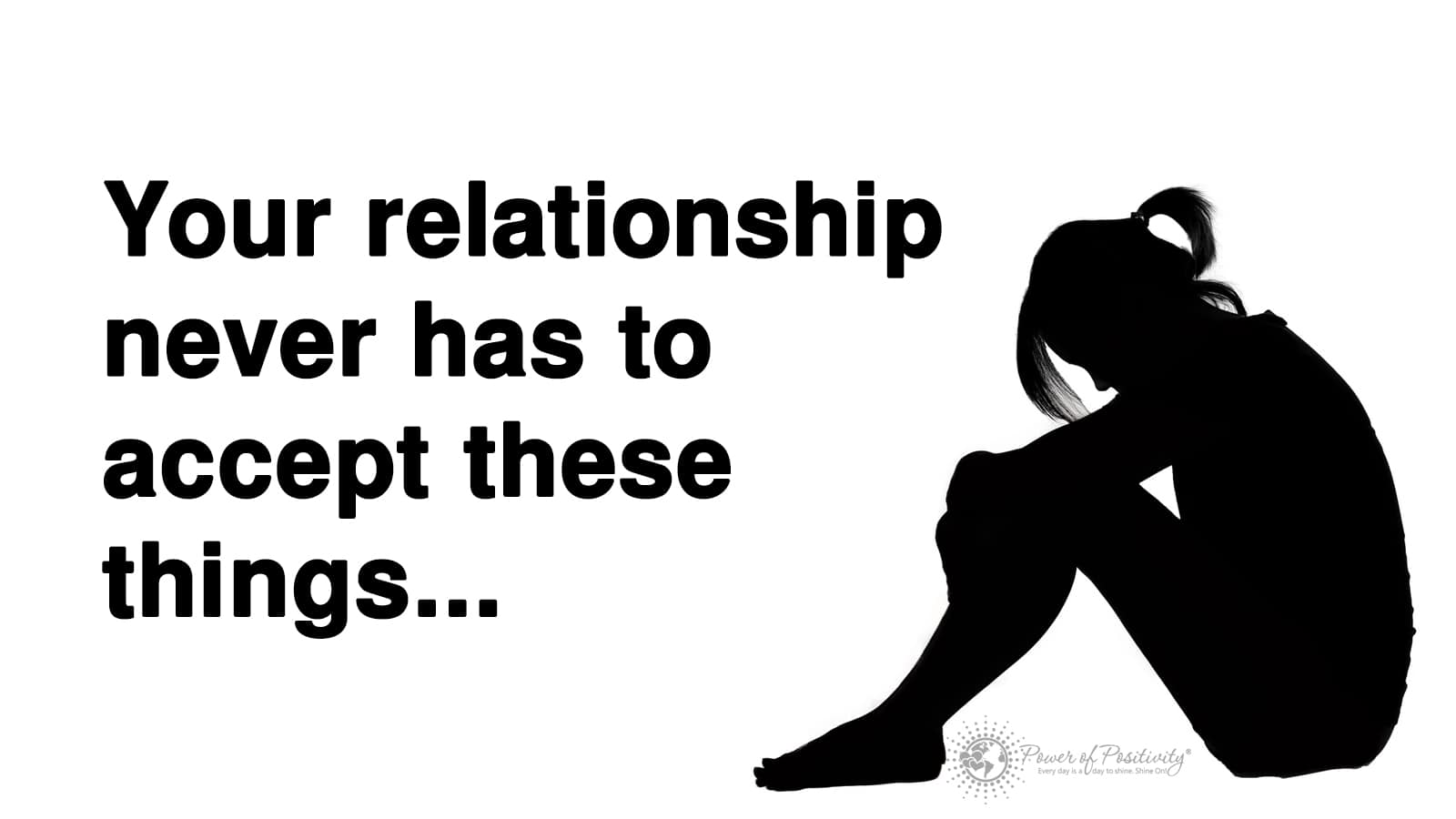They say that hindsight is 20-20, and looking back on past relationships, it is often easier to see the things you overlooked at the time but now seem so wrong about your partner’s behavior.
Although emotions are normal, a healthy relationship does not cause hurt, fear, or anger regularly. It might be time to take a step back and reevaluate your relationship if you’ve started to accept these things as usual.
21 Behaviors You Must Not Accept in Your Relationship
Never assume these things as expected from your partner.
1. Broken Relationship Boundaries
You have made it clear to your partner that you have certain boundaries that are important to you, but your partner keeps crossing them. Their lack of respect for what is important to them is not part of a normal, healthy relationship.
Clinical psychologist Ryan Howe says that partners in a healthy relationship “ask permission, take one another’s feelings into account, show gratitude and respect differences in opinion, perspective, and feelings.” Howe says that “Boundaries in romantic relationships are especially critical because, as opposed to other relationships, partners inhabit each other’s most intimate spaces, including physical, emotional and sexual.”
2. Aggression
Physical violence, verbal, sexual, or emotional abuse is never routine in a relationship. If you have said no to sex, but your partner forced it on you anyway, that could constitute rape, even within a marriage. Anything that hurts you or feels wrong should never be considered normal for a relationship.
Fearing your partner’s behavior is a sign that you need to separate yourself from them, get to a safe place and possibly report their actions to the police. Contact the national domestic violence hotline at 1-800-799-7233, document the abuse, and protect yourself from further harm.
3. Controlling Everything in the Relationship
Some people who have a Type A personality will feel more comfortable having significant control over things. But your partner shouldn’t be the only person making all of the decisions for you.
A relationship is a partnership, and you both should have a say in your day-to-day activities, meals, shopping, etc. If your partner feels the need to control every decision that affects you, you should not assume that their behavior is expected.
Talk with your partner to express your frustration over not having control. Pick one or two most important things for you to control, and ask them to let you have a say in those.
4. Accusations
If your partner not only distrusts you but accuses you of cheating without any grounds to do so, their jealous behavior is not normal. If you’ve not given your partner any reason to be concerned, but they accuse you of having a wandering eye or flirting too much with someone, it is most likely their insecurity that is causing them to talk to you this way not your behavior.
5. Lies
Some lying is normal, but not where your security is concerned. In a study where people kept track of how many lies they told for a week, the average was one to two lies per day. Typically, people lied to prevent hurting someone’s feelings, such as telling someone they looked good when they didn’t think they did. Researchers believe that small lies are usual for maintaining positive social relationships.
Being lied to by your partner creates an environment of distrust. It isn’t easy to feel safe, secure, and loved without trust. Whether you’ve caught your partner in a lie by finding evidence that they’ve hidden, or your gut is telling you that something’s not right, your intuition knows that you are being deceived.
You have a right to have an honest relationship. If you believe that your partner is lying about sex, money, or dangerous behavior like drugs or alcohol, your safety is potentially at risk. In this case, the lie could hurt you by exposing you to disease, financial insecurity, or potentially violent behavior.
6. A Relationship Filled With Demeaning Language
No one deserves to be treated disrespectfully. If your partner has used racial slurs, cursing, or belittling language against you, it should never be considered a normal part of a relationship. Sure it’s normal for couples to argue, but putting someone down to win an argument is not okay.
Even if your partner discounts your ideas as silly or stupid, that is not normal in a relationship. You deserve to be with someone who will support and defend you, not put you down and make you feel bad.
Being your advocate in an unhealthy relationship can be difficult. Especially if you feel that you have no power to change things. Communicating with someone who won’t listen is not going to work.
Seek the help of a trusted friend or a licensed counselor as an excellent step to help yourself heal from a bad relationship. Put it behind you and know that your next relationship will be better now that you know normal.
7. Physical or Emotional Abuse
Abuse often creeps up in a relationship, catching the victim off guard. It doesn’t happen immediately, but once it does, it continually intensifies. Many people stay in the situation, but it’s something you should never tolerate.
Physical abuse isn’t the only form, as emotional or mental abuse is also prominent. It destroys your self-esteem, makes you second-guess yourself, and is detrimental to your overall well-being.
8. Gaslighting
It’s never okay if your partner tries to convince you that you’re wrong when you’re not. They might tell you that you’re crazy to make you back down and question yourself. Your partner might also tell you they were joking or imply that you need to let something go.
Gaslighting partners often makes you feel like you’re wrong for having feelings. They’ll dismiss your concerns and continue behavior that hurts you. If you notice these things in your romance, it’s time to end it. You don’t deserve to deal with gaslighting, and it’s detrimental to your well-being.
9. Judging and Shaming
If your partner judges or shames you, it’s a bad sign. It shows that they lack respect for you, and they aren’t being kind. A healthy relationship involves a partner who respectfully helps you improve who you are but doesn’t judge and shame you.
On the other hand, an unhealthy romance involves a partner who constantly points out what’s wrong with you. They might make remarks about your personality, body, or abilities. Judging and shaming are ways for someone to exert control, but you don’t have to tolerate the disrespect.
10. Interrupting or Talking Over You
If your partner constantly talks over you or interrupts, it’s negative. It shows that they lack respect and don’t actively listen. Communication is essential to a healthy relationship, so don’t accept anything less.
11. A Relationship That Isolates You
Anytime your partner tries to control who you spend time with, it’s a sign that this partnership isn’t meant to be. It’s okay if you have close relationships with friends and family members, and it’s not okay for your partner to say otherwise. Independence is essential to a healthy romance, including having a life outside your partner.
If your partner isolates you, it shows that they want to assert their dominance by interfering with your happiness and self-care. When your partner doesn’t want you to spend time with people you love, it indicates they have something to hide.
They might think the people close to you will notice flaws and point them out. Additionally, they might be insecure and get jealous of your other relationships. No matter what their reason is, your relationships still matter.
You might notice that they don’t support your friendships and refuse to spend time with them. Their refusal will eventually result in them asking you to stop seeing that person, too. They might also dismiss or insult your family, creating a barrier that is hard to overcome.
12. Jealousy, Neediness, and Being Clingy
Being in a relationship with someone who is obsessively jealous, needy, or clingy is never desirable. Everyone has moments of jealousy, but it shouldn’t occur constantly or involve them calling you repeatedly while you’re with friends.
Clingy behavior shows a lack of self-esteem and insecurity and can be challenging to handle. You might feel suffocated to the point of exhaustion. It isn’t your job to fix people, and you shouldn’t have to deal with these issues if they don’t seek help.

13. Stonewalling
Stonewalling is a demeaning behavior that ignores your feelings and shuts you out. If your partner does it, they might refuse to answer, or they’ll walk away during a conversation. Your partner should be willing to have an open discussion and improve their detrimental behavior.
14. Lying or Breaking Your Trust
Honesty is essential in a healthy relationship, and you shouldn’t tolerate anything else. There are many ways your partner can break your trust, including bad-mouthing you or not following through on commitments. Additionally, lying is always unacceptable unless they’re throwing you a surprise party.
If your partner cheats, you must address and deal with the problem. Every situation is different, but you must take care of the situation either way.
15. Belittling Your Career Aspirations
You can’t have a healthy relationship with someone who doesn’t believe in you or support your dreams. If your partner continually insults your work, mocks your achievements, or tells you to give up, they’re not the person for you. You want someone who will only provide constructive criticism and constant support.
16. Never Apologizing
Healthy relationships have partners who apologize when they’re wrong. It’s not a good look if your partner thinks the world revolves around them. When something goes wrong, they blame others and never own up. If you allow this behavior, it’ll erode your self-esteem.
17. Invalidating Your Feelings or Experiences
Don’t tolerate your partner trying to convince you that your feelings or experiences are untrue or insignificant. Additionally, if you vocalize how you feel and your partner responds by saying it’s not a big deal. They might also belittle you for not being open enough.
A partner in a healthy relationship should strive to learn about the issues you face. They should want to understand what upsets you rather than telling you to let it go.
18. Irrational Comparisons to a Past Relationship
Everyone doubts themselves sometimes, but your partner should never make it worse by comparing you to others. Your partner should cherish you and your imperfections. Comparing you to others depletes your self-esteem, and it’s something you should never tolerate.
19. Not Publicly Acknowledging Your Relationship
If you’re in a committed relationship, your partner should be willing to acknowledge it publicly. Your romance shouldn’t be a secret, so don’t tolerate hiding your romance. You spend your time on the partnership and deserve it to be public.
If your partner asks you to keep it quiet, consider why they might want that. It could be that they don’t want to be tied down if someone else comes along, or they might have multiple partners. Additionally, you’ll have to wonder if they are embarrassed. Despite the reason, it shows a lack of respect for you, and it’s never okay to behave that way.
20. Constant Negativity
You can tolerate some negativity, but eventually, it’ll drag you down. Constant negativity gets frustrating, leading to yelling and other forms of disrespect. If you don’t tolerate negativity, your romance will become much better.
21. Arrogance and Entitlement
It’s okay to have a certain level of self-pride, but it can go too far. If your partner exhibits self-centeredness and arrogance, it might be time to rethink things. Your partner’s arrogance and entitlement are draining and unhealthy, so make it clear that you won’t tolerate it.
5 Steps to a Healthier Relationship
If there are aspects of your relationship that you can’t or shouldn’t accept, you can make positive changes. These steps will help you build a stronger, healthier, and happier partnership.
1. Focus on Positivity in the Relations
When you focus on the positive, you’ll notice a quick improvement in your relationship. Compliment your partner, acknowledge their hard work, surprise them, or do anything else to make them happy.
Doing simple things like telling your partner that you appreciate them can make a difference. It’ll help them feel satisfied, releasing some negativity between you.
As you focus on positivity, make sure to have a positive relationship with yourself. When you feel good about yourself, your romance will also improve. Identify the good things about yourself and remember that you are worthy.
2. Spend Time Together
Spending quality time together while remaining fully present is one of the best ways to create a healthier relationship. Turn your phone off and limit other distractions so that you and your partner can focus on one another. Choose activities that allow you to engage and have fun, such as taking a nature walk or preparing a meal together.
3. Encourage One Another to Accomplish Your Goals
If your partner wants to lose weight or exercise more, encourage them to make it happen. Be part of their support system by holding them accountable, keeping them motivated, and cheering them on. Encouraging your partner is a sure way to make a beneficial change.
4. Engage in Frequent Physical Contact
It doesn’t matter how long you’ve been together, but you must still engage in frequent physical contact. Hug each other whenever you can, especially when one of you returns home. Hugging improves your relationship, decreases depression, boosts the immune system, promotes sleep, and reduces stress. You and your partner are sure to benefit from the physical contact.

5. Communicate and Express Yourself
Don’t be afraid to talk to your partner about anything, including issues you feel need addressing. A healthy relationship requires communication and self-expression, so don’t hold back. Remember to be kind and respectful as you communicate so that you don’t worsen the problems.
Express your thoughts and feelings without restraint, so your partner knows what you want and expect. Make sure you give your partner the same opportunity for expression so that they feel heard, too.



















